They really do seem to love Jay Powell’s announcement effect, these Germans. Magic words, no relation to what’s actually done only what’s said. Confirming in every way what I wrote yesterday, the psychology of money-less monetary policy being acted out exactly according to the plan. Central bankers do, those trained by Economics schools respond in predictable fashion.
Pavlov is in awe of Greenspan’s perpetuated ability.
It does make sense, no matter how grossly unattractive and intellectually bankrupt. There is only the one kind of training in colleges and universities across the world. Economics wields its iron-fisted grip on all levels of study. Sure, a passing mention or two of Hayek here and there, typically derisively, but by and large Keynes fills out the majority syllabus polished off with a heaping dose of Chicago-style Friedman Positive Economics and econometrics.
Thus, those who take any course in Economics have drilled into them the simple programmed routine intended to last their whole career: If CENTRAL BANK = ACTIVITY, then STIMULUS.
Fund managers and portfolio advisors, yes, but also business professionals of all kinds especially those filling out the upper-level positions like purchasing managers and CFO’s. These are the suits churned out by these schools, all of them believing wholeheartedly that their statistical models are better than sex, and more realistic than reality.
In some ways it’s astonishing the differences then and now; Germany’s ZEW survey had been one of, if not the, first signs of trouble in the earliest days/weeks/months of Euro$ #4. The sentiment index plunged back when Mario Draghi and Jay Powell had nearly perfected their ventriloquism, speaking about only inflation and accelerating growth yet the words coming flawlessly out of the mouths of the Economics-trained Bond Kings.
Perhaps it was Draghi’s threatened removal of “stimulus” throughout which had unnerved the survey respondents. Europe’s economy was, in fact, acting the opposite of what the forecasts had been forecasting. For a very long time, so long as the ECB’s officials remained in stubborn denial the ZEW spelled out the growing trouble.
Once the ECB went back into QE, though, all joy returned as Economics once more trumped conditions on the ground. These never changed, which is pretty much the point. The ZEW had done this before, twice, where once central banks started up their puppet show the intended audience, the Economics graduates in suits, euphorically clapped along – even as their situation didn’t actually improve.
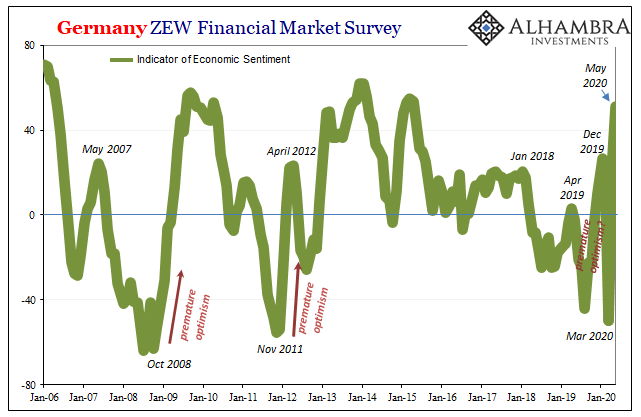
In March 2020, though, even sentiment was back in the toilet and why wouldn’t it be? Sure, central bankers were extra-busy but all that was easily torn from the front pages by the tidal wave of market dislocations none of them could stop. Once the liquidations stopped, and the “stimulus” had the media to itself, Pavlov revisited.
In just two months, the ECB outdoing itself in between, aided in no small part by the German government ditching its historical frugality, the sentiment index has surged by 100 freakin’ points. Two months. One hundred.
Ring. Ring. Good doggies.
But their salivation, like our salvation, ends there. Looking ahead it’s all wonderful because ahead is as nebulous and non-specific as you can imagine. Stimulus is awesome, they just can’t tell you when or how it will be. Premature celebration every time. What makes it different this time? Be specific.
If you want specifics: looking at where it stands right now even the suits are throwing up.
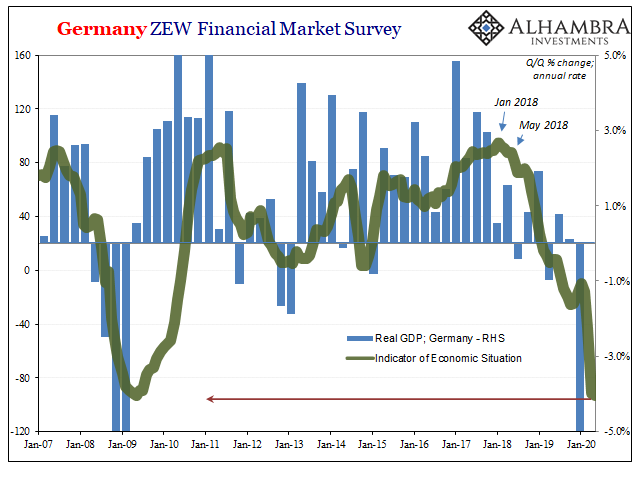
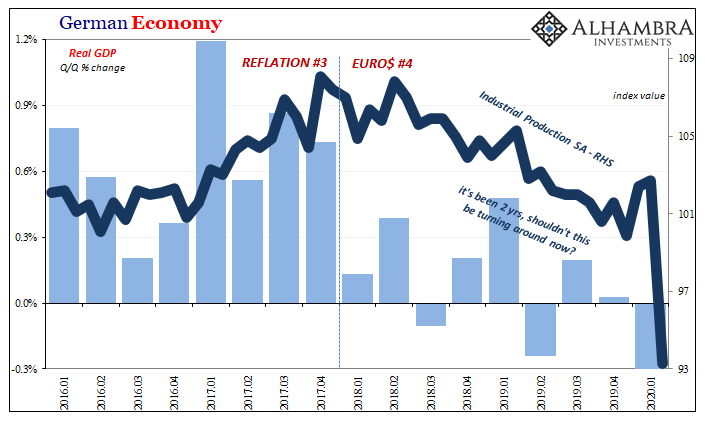
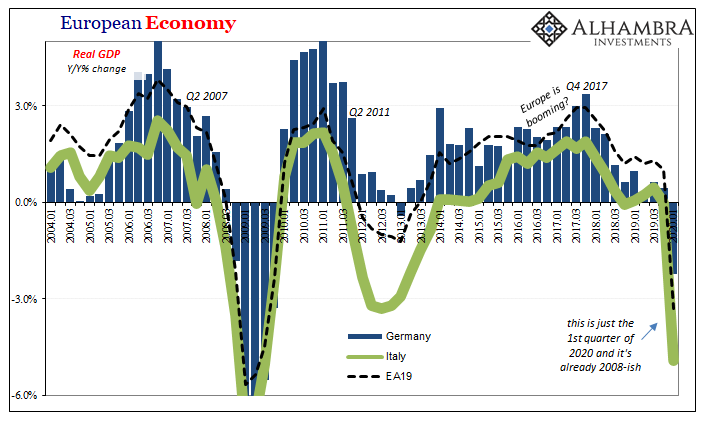
The narrative that is emerging which intends to justify this divergence is how COVID-19 is some natural disaster. A short-term non-economic dislocation and nothing more, temporarily huge but soon forgotten once the world gets back on its feet and those feet marching back to work.
And if encountering any trouble in that restorative process, central bank policies and “stimulus” are supposed to ensure to the point of guaranteeing the smooth sailing. Based on what, though? Sure isn’t history, recent and otherwise.
While the pandemic qualifies as non-economic, GFC2 does not. It has already been a severe hindrance (revealing such fragility) which has and will continue to impede the system’s progress back up from historic lows.
Just yesterday, none other than Jay Powell himself slyly worked in this bad news (we’ll be lucky to get back to even by the end of next year, he admitted) but careful to wrap it up first within the sounds of the next ring of his bell – “we have the ability to create money digitally.”
Guess which part everyone “heard?”
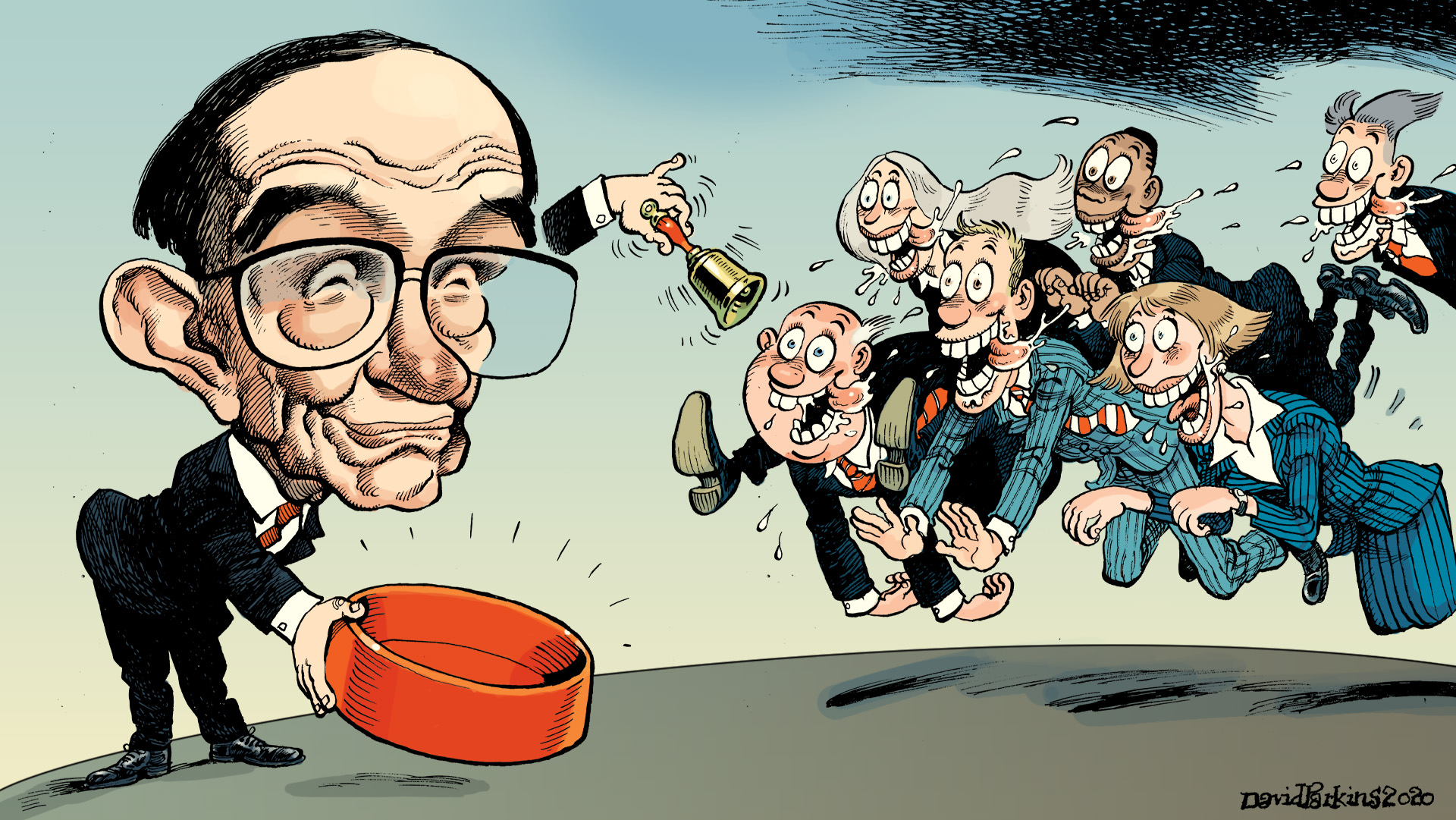
No, Jay, you have the ability to create bank reserves digitally and at will. There’s a huge difference and it just doesn’t mean as much as you’ve led the suits to believe. At times like today, yours is the only voice being broadcast. At those like March or late 2008, even the suits are left to dream about only the future because they can’t stand how contrarily the world doesn’t look like the classroom.
The ECB failed Germany’s economy in 2008 and then again in 2012. Didn’t disappoint ZEW sentiment, though. It failed once more in 2018 and throughout 2019, both sentiment and situation. But now, with a historic shock underway, what failed uniformly throughout history is guaranteed to work this time with the economic hole already as big as it has ever been? Sign up all the suits for this sentiment!
Wow. Economics really is impressive if for reasons that have absolutely nothing whatsoever to do with the economy. Any economy.

Stay In Touch